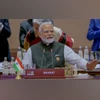Foreign policy issues influencing domestic electoral narratives are rare in independent India’s history. In the past nine years, the Narendra Modi-led National Democratic Alliance (NDA) government and the ruling Bharatiya Janata Party (BJP) have burnished the PM’s image as a charismatic global leader to whom world leaders turn for advice and even to broker peace.
Would India’s G20 presidency and successful hosting of the Leaders’ Summit add to that and help the BJP electorally in the coming months?
On Saturday night, the party’s social media posts reflected its upcoming campaign. “The reasons India’s G20 presidency is being hailed as one of the most successful in history” were because of the African Union’s induction as a G20 member, the announcement of the rail and shipping link between India, the Middle East, and Europe, the adoption of G20 Leaders' declaration with China and Russia in agreement, and the launch of the Global Biofuel Alliance by the prime minister, the BJP posted on its official handle on X.
BJP sources indicated that the five-day special session of Parliament, from 18 to 22 September, will have party members extol the PM’s contribution to India’s successful G20 presidency. The party will organise programmes across the country during its sewa pakhwara, the fortnight from Modi's 73rd birthday on September 17 until the birth anniversary of Mahatma Gandhi on October 2, hailing the PM’s contribution to India’s greater glory.
This is not an unfamiliar strategy for the BJP. In the mid of the 2022 February-March Uttar Pradesh Assembly polls, the BJP campaign on the ground projected Modi as a world leader mediating to end the Russian invasion of Ukraine that began on February 24, 2022.
The 2009 Lok Sabha is the most recent example of a party succeeding in shaping its election narrative based on its government's foreign policy successes. In the run-up to the 2009 polls, the Congress and then Prime Minister Manmohan Singh’s press adviser, Sanjaya Baru, crafted the successful “Singh is King” campaign. It projected Manmohan Singh as a strong leader who delivered the India-US nuclear deal, economic growth, and rights-based laws versus his seemingly enervated opponent, the BJP's LK Advani.
More From This Section
But Baru is sceptical of the BJP’s ability to sway voters with its “Vishwaguru campaign". He said 2009 was an exception, resulting from the government’s good performance on foreign policy, economy, and welfare. But now, the Opposition would corner the BJP on livelihood issues, questioning it on the alleged Chinese occupation of Indian territory. He said people will quickly forget G20 since the government’s performance is poor on most fronts. “The entire Opposition had ganged up against Manmohan Singh in 2009. It was a David versus Goliath fight. Unlike Singh’s David then, now Modi is the Goliath. Unlike in 2009, when Singh faced a five-year pro-incumbency, Modi will be facing a 10-year anti-incumbency with very little to show in terms of the government’s performance,” Baru said.
There is, however, much from the hosting of the G20 that the BJP could take to the people since, as the Opposition alleged, the Modi government swapped the G20 Summit hosting rights with Indonesia so that New Delhi organised it a year later than slated and closer to the 2024 general elections. The government has held meetings of the grouping across India.
The PM on Saturday described India’s presidency as the “people’s G20”. The government showcased India’s civilisational history as the leitmotif of its eventful year-long presidency, with the Upanishadic tenet of “Vasudhaiva Kutumbakam” as the theme, Modi invoking a Brahmi precept from an Ashokan pillar in his keynote address, and the use of 'Bharat', instead of 'India', on dinner invites, badges and nameplates.
The Opposition also complained about the G20 logo, which has an orange lotus, resembling the BJP's election symbol, although it is India’s national flower, but pink. The BJP currently carries both Vasudhaiva Kutumbakam and the G20 logo prominently on its social media handles. Former Union minister Yashwant Sinha said the government organised the G20 with an eye on the election. "The presidency of G20 has come to India 15 years after it was raised to summit level. It had to come someday. But Modi has proved that drama and publicity are everything,” Sinha said.
On Saturday, Union Home Minister Amit Shah congratulated the prime minister for the “historic success of our G20 presidency”. “Whether it is the adoption of the New Delhi Leaders’ Declaration or the inclusion of the African Union as a permanent member, the Summit built bridges of trust among geopolitical regions, standing true to Modi ji's vision of 'One Earth One Family One Future',” Shah said. In February, Shah defended the government's advertising blitzkrieg on G20. "If India got the leadership of G20 under Modi and if the Summit is organised successfully and with aplomb, then Modi should get the credit," he told ANI, adding, "Should the Opposition get it? Obviously, the credit will go to Modi."
According to political commentator Radhika Ramaseshan, the hosting of G20 could help the BJP electorally and found it reminiscent of her travel to parts of UP in the 2022 Assembly polls, where the BJP highlighted Modi's prominent standing in mediating in the Russia-Ukraine war, and people seemed to acknowledge it. "It could have an impact, just as the 2009 'Singh is King' did. The BJP would campaign how Modi's leadership had the wealthier nations induct the African Union as a G20 member," she said.
Apart from world leaders accepting Modi's exposition, as Shah pointed out the BJP campaign would include several other elements from the G20 declaration, such as Modi fighting for the cause of the developing world. The declaration, while not mentioning the phrase Global South, pledges to better integrate the perspectives of developing countries, including LDCs, LLDCs, and SIDS, into future G20 agenda and strengthen developing countries' voices in global decision-making. It also embraced the PM's campaign to increase millet use and that of other traditional crops.

)
